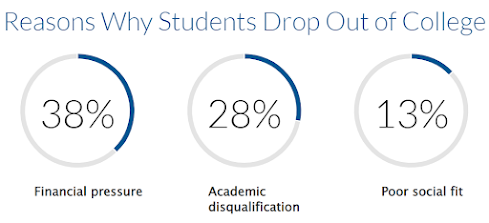How many times have you heard the question, “What do you want to do when you graduate from high school?” If you are close to graduation, then you are hearing it more and more as the school year comes to a close. What reaction do you get if you dare to say that college is not the path for you? The pressure to attend college is enormous. It is why so many young people choose college even though statistics show it isn’t always the best option.
One major reason is the debt required to get through college.For many starting in kindergarten, the message has been to every
student to work hard and get top grades which will lead to a good college. A
great job will follow and then you will live happily ever after. This is not
the case for many. One young woman shares her story. She took out loans to attend
an expensive private college to earn an associate’s degree in occupational
therapy. The coronavirus hit just as she reached graduation. After two unsuccessful
years of searching for a job, she ended up going back to the group home where
she was previously working earning $16 an hour. She explains: “I would give
anything to go back and not go to college. It wasn’t worth it. My credit score
plummeted from missing one payment. I am literally trapped by these loans” (Wolfson,
2022). Do not let this be your story.
A study was done almost ten years ago. Twenty thousand high school students participated. The students were asked to read a list of values and mark each item that they felt was important or essential. Being treated with respect was number one on the list at 99 percent. Fifty-six of the students marked being popular as essential. Being wealthy was at 70 percent. Having good moral character, helping others, and having trusted personal relationships were at 98 percent. Would it be surprising to learn that right under those was getting into college at 97 percent? (Josephson, 2013). As a society, we have become habitual in believing and reciting to students that college is the best and only path.
Recently, a very wise teacher mentioned the author, Bryan Caplan, who wrote a book, “The Case Against Education: Why the Education System is a Waste of Time and Money.” She explained that he writes that college is not a good investment. It used to be that having a bachelor’s degree made a person stand out but now that many people have them, they do not mean anything. As young people have begun to realize this, they have sought even higher education pursuing master’s and doctorate degrees. She poses a great question, “Is it a proving ground to grow and self-actualize or is it just torture that needs to be let go?” (R. Reed, personal communication, April 7, 2022). College is not a necessity for everyone. There are plenty of other options:
https://docs.google.com/document/d/1CqKjsC-lSeLsz87D4rCb42Ue_V2fySDi5__EmJzxkm0/edit?usp=sharing
#collegeisnotthepathforeveryone
References
Covey,
S. R. (2020). The 7 habits of highly effective people, Chapter about HABIT
4.
Josephson, M. (2013). What
do teens really value? What Will Matter. https://whatwillmatter.com/2013/11/what-do-teens-really-value-a-josephson-institute-survey-of-more-than-20000-high-school-students-reveals-surprising-information-about-their-values/#:~:text=Being%20treated%20with%20respect%20%E2%80%93%2099,Helping%20others%20%E2%80%93%2098%20percent.
Ratts, M. J., DeKruyf, L.,
Chen-Hayes, S. F., (2007). The ACA Advocacy Competencies: A social justice
advocacy framework for professional school counselors. American School
Counselor Association. Available at http://digitalcommons.georgefox.edu/gsc/9
Wolfson, A. (2022, April
6). 'Going to college ruined my life.' I have $85K in student loan debt for
my 'useless degree' but only make $16 per hour. how can I cope?
MarketWatch. https://www.marketwatch.com/picks/going-to-college-ruined-my-life-i-have-85k-in-student-loan-debt-for-my-useless-degree-but-only-make-16-per-hour-how-can-i-cope-01649182222
Image
Sources
Caplan, B. D. (2019). The
case against education: Why the education system is a waste of time and money.
Princeton University Press.
Image of jobs with low
employment. 52 statistics & reasons not to go to
college: 2021/2022 Data & Analysis. Financesonline.com. https://financesonline.com/reasons-not-to-go-to-college-statistics/
Image of reasons why students
drop out of college. 52 statistics & reasons not to go to college:
2021/2022 Data & Analysis. Financesonline.com. https://financesonline.com/reasons-not-to-go-to-college-statistics/
Image of student debt. 52 statistics & reasons not to go to college: 2021/2022 Data & Analysis. Financesonline.com. https://financesonline.com/reasons-not-to-go-to-college-statistics/




No comments:
Post a Comment